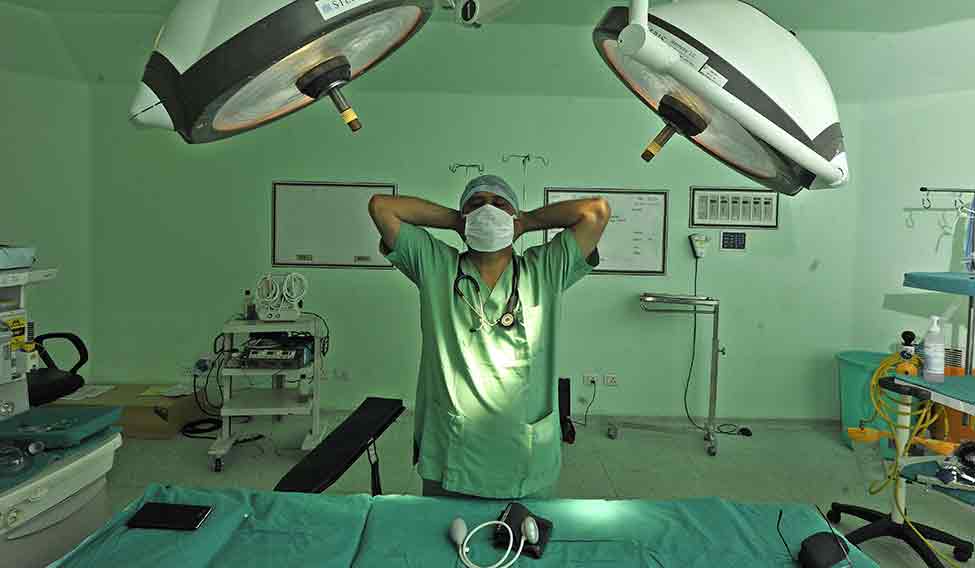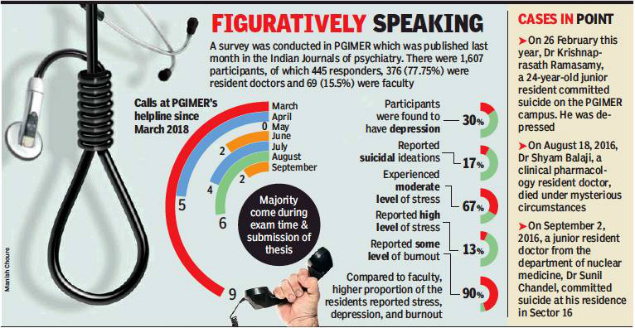Dealing with death stresses out the Doctors: Findings
 An analysis of the helpline calls in Postgraduate Institute of Medical Education and Research (PGIMER) reveals that one of the main reasons for stress among the resident doctors were seeing patients dying or those on the verge of dying. Though the NGO’s and some selected government bodies set up helplines, PGIMER started an in-house crisis helpline in the wake of the death of two resident doctors who killed themselves in 2016.
An analysis of the helpline calls in Postgraduate Institute of Medical Education and Research (PGIMER) reveals that one of the main reasons for stress among the resident doctors were seeing patients dying or those on the verge of dying. Though the NGO’s and some selected government bodies set up helplines, PGIMER started an in-house crisis helpline in the wake of the death of two resident doctors who killed themselves in 2016.
PGIMER surveyed 1607 participants, of which 445 responded. Among them, around 77.75%(376) were resident doctors and 15.5%(69) faculty. The results of the analysis are somewhat uncommon. While some doctors stressed in seeing patients die, for others, it was their inability to even diagnose an ailment despite having read a lot in medicine.

“I cannot forget the face of a mother who wanted me to save to save her child, but I could not. This daily haunted and disturbed me,” said a junior resident doctor at the PGIMER.
“Dealing with people dying or those close to death puts a lot of burden and emotional stress on the doctors and many of them break down. Doctors dealing with such cases more frequently should not be posted in such areas for long. These postings should be short and the resident doctors should be given adequate off from work so that they can overcome or learn to deal with their emotional stress,” says Dr Sandeep Grover, a psychiatrist who has been working on the crisis helpline at the PGIMER. There have been three suicides in the PGIMER of resident doctors since 2016. “We see various types of cases that include depression, anxiety and problems in adjustments,” adds Grover.
Along with that, workload and burnout contribute to mental stress. This increases during the time of exams and when posted continuously in the emergency. It is hard to imagine specialists in PGIMER feeling low when it comes to seeing a patient die on his/her hands. “This usually happens the world over during initial training and it also depends on someone’s personality,” says Prof Amod Gupta, former sub-dean at PGIMER. He also adds that the doctors are taught not to show any signs of emotion while dealing with them. But, he says things are changing now. As patients are being treated like case studies and they are losing faith, the doctors emphasise on empathy. And it would make such doctors feel low after coming across critically ill patients who are beyond treatment.
Two months ago, the IMA formed a national IMA committee,-‘Doctor Know Thyself’- for emotional health and well-being of medical students and doctors.
“Keeping in view the high stress and high physical and psychological morbidity among the residents, the medical college must initiate efforts to enhance physical and mental wellbeing among residents,” said Dr B S Chavan, head of psychiatry department at Government Medical College and Hospital, Chandigarh.
The students of medical colleges in India experience the highest level of stress than students in any other countries according to a statement by the Indian Medical Association.
Source: https://timesofindia.indiatimes.com/city/chandigarh/dealing-with-death-stressing-out-pgi-docs/articleshow/65878587.cms
Images: The week, Times of India